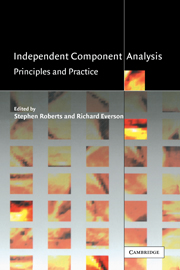Book contents
- Frontmatter
- Contents
- Preface
- Contributors
- 1 Introduction
- 2 Fast ICA by a fixed-point algorithm that maximizes non-Gaussianity
- 3 ICA, graphical models and variational methods
- 4 Nonlinear ICA
- 5 Separation of non-stationary natural signals
- 6 Separation of non-stationary sources: algorithms and performance
- 7 Blind source separation by sparse decomposition in a signal dictionary
- 8 Ensemble Learning for blind source separation
- 9 Image processing methods using ICA mixture models
- 10 Latent class and trait models for data classification and visualisation
- 11 Particle filters for non-stationary ICA
- 12 ICA: model order selection and dynamic source models
- References
- Index
2 - Fast ICA by a fixed-point algorithm that maximizes non-Gaussianity
Published online by Cambridge University Press: 05 July 2014
- Frontmatter
- Contents
- Preface
- Contributors
- 1 Introduction
- 2 Fast ICA by a fixed-point algorithm that maximizes non-Gaussianity
- 3 ICA, graphical models and variational methods
- 4 Nonlinear ICA
- 5 Separation of non-stationary natural signals
- 6 Separation of non-stationary sources: algorithms and performance
- 7 Blind source separation by sparse decomposition in a signal dictionary
- 8 Ensemble Learning for blind source separation
- 9 Image processing methods using ICA mixture models
- 10 Latent class and trait models for data classification and visualisation
- 11 Particle filters for non-stationary ICA
- 12 ICA: model order selection and dynamic source models
- References
- Index
Summary
Non-Gaussianity is of paramount importance in ICA estimation. Without non-Gaussianity the estimation is not possible at all (unless the independent components have time-dependences). Therefore, it is not surprising that non-Gaussianity could be used as a leading principle in ICA estimation.
In this chapter, we derive a simple principle of ICA estimation: the independent components can be found as the projections that maximize non-Gaussianity. In addition to its intuitive appeal, this approach allows us to derive a highly efficient ICA algorithm, Fast ICA. This is a fixed-point algorithm that can be used for estimating the independent components one by one. At the end of the chapter, it will be seen that it is closely connected to maximum likelihood or infomax estimation as well.
Whitening
First, let us consider preprocessing techniques that are essential if we want to develop fast ICA methods.
The rather trivial preprocessing that is used in many cases is to centre x, i.e. subtract its mean vector m = ε{x} so as to make x a zero-mean variable. This implies that s is zero-mean as well. This preprocessing is made solely to simplify the ICA algorithms: it does not mean that the mean could not be estimated. After estimating the mixing matrix A with centred data, we can complete the estimation by adding the mean vector of s back to the centred estimates of s.
- Type
- Chapter
- Information
- Independent Component AnalysisPrinciples and Practice, pp. 71 - 94Publisher: Cambridge University PressPrint publication year: 2001
- 9
- Cited by



